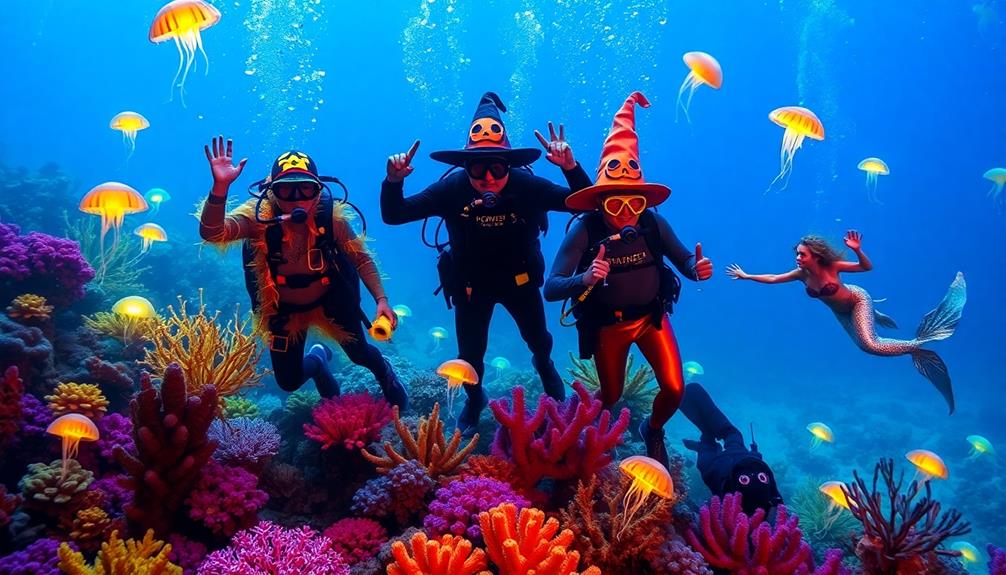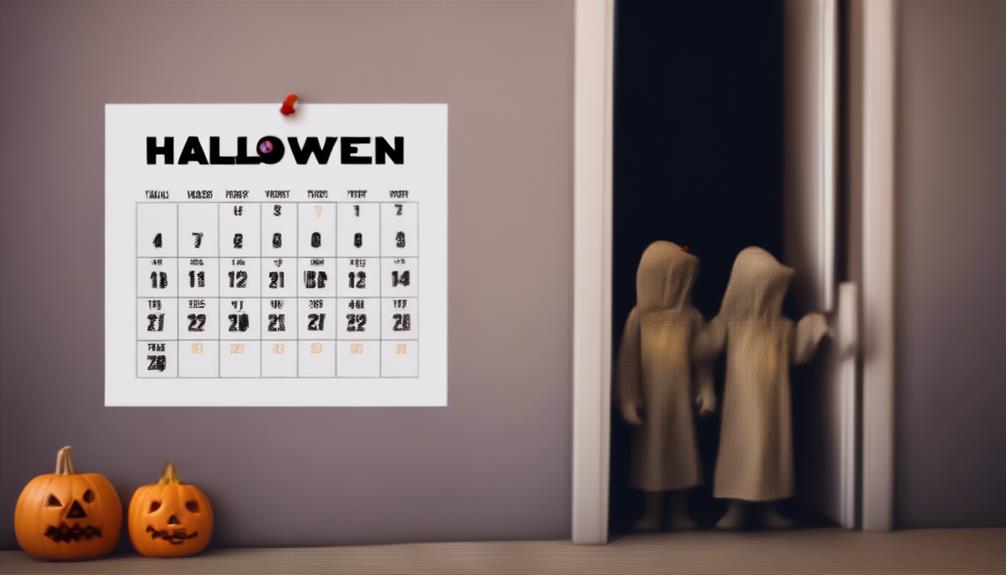While wearing a Halloween mask in public is generally allowed, there are exceptions and specific laws to keep in mind. Some states, like North Carolina and Florida, have laws prohibiting masks in public, unless it's for traditional holiday costumes or other exempted circumstances. It's essential to know the laws in your area before donning a mask. Additionally, consider the safety implications of wearing a mask, such as reduced peripheral vision, which can increase the risk of accidents. By being aware of these factors, you can make an informed decision about wearing a Halloween mask in public. Take a closer look to explore more about the laws and safety concerns surrounding Halloween masks.
Key Takeaways
• Wearing Halloween masks in public is generally allowed, but there are exceptions and specific laws to be aware of, varying by state and circumstance.
• Some states, like North Carolina and Florida, have laws prohibiting masks in public, with exemptions for traditional holiday costumes and other circumstances.
• Anti-mask laws, dating back to the 19th century, were intended to curb masked gatherings and intimidation, but have been challenged for their impact on free speech and assembly.
• Wearing a Halloween mask can impair vision, increasing the risk of accidents or injuries, especially in low-light conditions or crowded areas.
• It's crucial to know specific laws and regulations in your area before wearing a mask or costume, and to prioritize safety and the safety of others.
Are Halloween Masks Legal Everywhere?
As you prepare to don a spooky disguise, you're likely wondering: are Halloween masks legal everywhere?
While Halloween masks are generally allowed in public, there are exceptions and specific laws to bear in mind.
In some states, wearing a mask in public can lead to charges of criminal loitering or other crimes if permission isn't obtained from authorities or if it's deemed to be intimidating or threatening.
For instance, in North Carolina, it's illegal for anyone over 16 to wear a mask or hood that conceals their identity in public, unless it's for traditional holiday costumes, theatrical productions, protective purposes, or demonstrations on private property with written permission.
Similarly, Florida has anti-mask laws that prohibit wearing a mask or hood on public property, with exemptions for certain circumstances.
Be aware of specific laws and regulations in your area before wearing a mask or costume, as knowledge of these rules is crucial.
Wearing Masks While Driving Safety
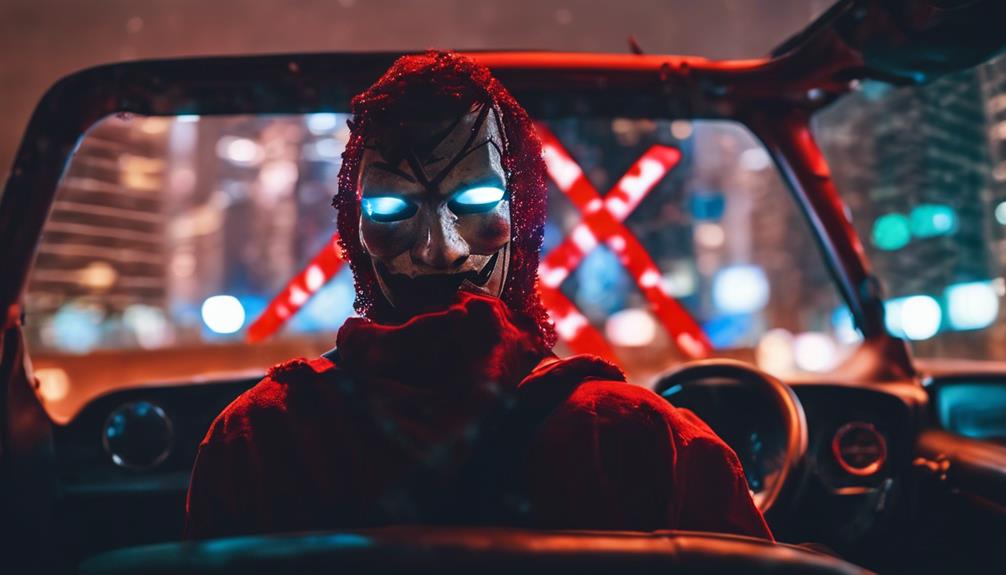
While you're preparing for a spooky night out, you should also consider the safety implications of wearing a Halloween mask while driving, as obscured vision can lead to accidents on the road.
Wearing masks can greatly impair your peripheral vision, making it difficult to detect pedestrians, bicyclists, or other vehicles. Additionally, the mask's design can create blind spots, reducing your ability to check your rearview and side mirrors.
When wearing masks, prioritizing your safety and the safety of others on the road is vital. Consider removing your mask while driving or choosing a mask that doesn't obstruct your vision.
If you must wear a mask, make certain it's securely fastened and doesn't slip over your eyes. It's also vital to be extra cautious and defensive while driving, as your reaction time may be slower due to reduced visibility.
Anti-Mask Laws in the US
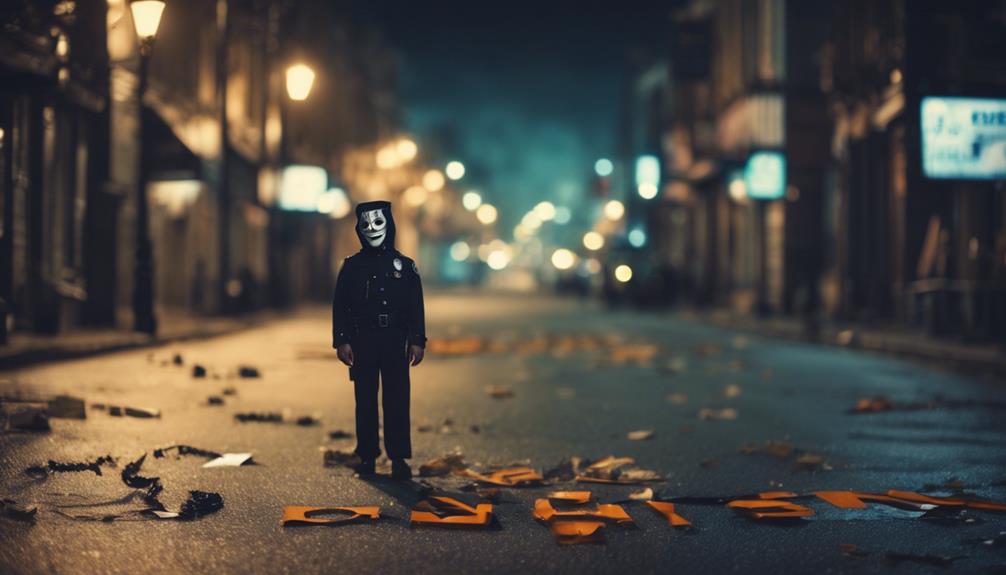
As you explore the world of Halloween masks, you'll discover that anti-mask laws in the US have a complex history and varying regulations across states.
These laws have a significant impact on your ability to wear a Halloween mask in public. Some states, like New York and California, have strict laws prohibiting masks in public.
However, others, like Michigan, have exemptions for religious or medical purposes.
As you navigate these laws, you'll see how they impact your ability to wear a Halloween mask in public.
Historic Mask Bans
In the United States, a patchwork of anti-mask laws has existed since 1845, when New York State first enacted legislation to combat landlord-tenant disputes and later to target the Ku Klux Klan.
You might be surprised to learn that many states, including California, Florida, and Georgia, have anti-mask laws, some dating back to the mid-20th century to prevent Ku Klux Klan activities.
These laws were originally intended to curb masked gatherings and intimidation, but they've since been challenged for their impact on free speech and assembly.
For instance, in 1951, the Georgia Supreme Court upheld the state's anti-mask law, ruling that wearing a mask in public wasn't a form of protected free speech.
The American Civil Liberties Union (ACLU) has challenged these laws, arguing that they violate the right to anonymous speech and assembly.
In recent years, courts have started to strike down these laws, like in 2017 when a federal court in Virginia ruled that the state's anti-mask law was overly broad and violated the First Amendment rights of protesters.
State-by-State Laws
From state to state, anti-mask laws vary widely, with some laws targeting specific behaviors, like intimidation, and others focusing on concealing one's identity in public. This means you'll need to research the specific laws in the state you're in to determine if wearing a Halloween mask is legal.
Some states have stricter laws than others.
In Florida, it's illegal for anyone over 16 to wear a mask or hood on public lawns, walks, alleys, streets, roads, or highways.
In North Carolina, it's illegal for anyone over 16 to wear a mask or hood that conceals their identity in public, except for traditional holiday costumes.
In Georgia, the anti-mask law was originally intended to prevent intimidation and concealment of identity, but has been challenged on the grounds that it violates the guarantees of the First Amendment.
In California, there's no statewide anti-mask law, but some cities and counties have their own ordinances and regulations regarding the wearing of masks in public.
Masking Up Illegally
You'll likely run afoul of the law if you don a disguise in public without checking the specific anti-mask laws in your state or locality first.
Many states in the US have anti-mask laws that prohibit wearing masks or disguises in public. These laws date back to the mid-20th century, initially enacted to prevent Ku Klux Klan activities.
New York State's anti-mask law, for instance, was enacted in 1845 to maintain public safety. Similarly, other states have adopted such laws.
When you wear a mask in public, you may be breaking the law. Anti-mask laws have been applied to political protesters, such as those affiliated with the Occupy Movement or Anonymous, who wear Guy Fawkes masks.
These laws have been challenged on the grounds that they violate the guarantees of the First Amendment to the United States Constitution. In Florida, for example, it's illegal for anyone over 16 years old to wear a mask or hood on public property, and violators face a second-degree misdemeanor charge.
Can You Wear a Mask in Public?

Wearing a Halloween mask in public typically isn't an issue, but there are some exceptions and considerations to keep in mind. You can wear a mask in public as long as you're not breaking any laws or causing a disturbance. However, you should be aware of your surroundings and make sure you're not obstructing your vision or posing a risk to yourself or others.
Check local laws and regulations: Some cities or events may have specific rules about wearing masks in public.
Be mindful of your vision: If your mask obstructs your vision, it's not a good idea to wear it in public.
Consider the context: Wearing a mask in a crowded area or during a sensitive event may not be appropriate.
Use common sense: If you're unsure whether it's appropriate to wear a mask in a particular situation, trust your instincts and make a judgment call.
The Risks of Obstructed Vision
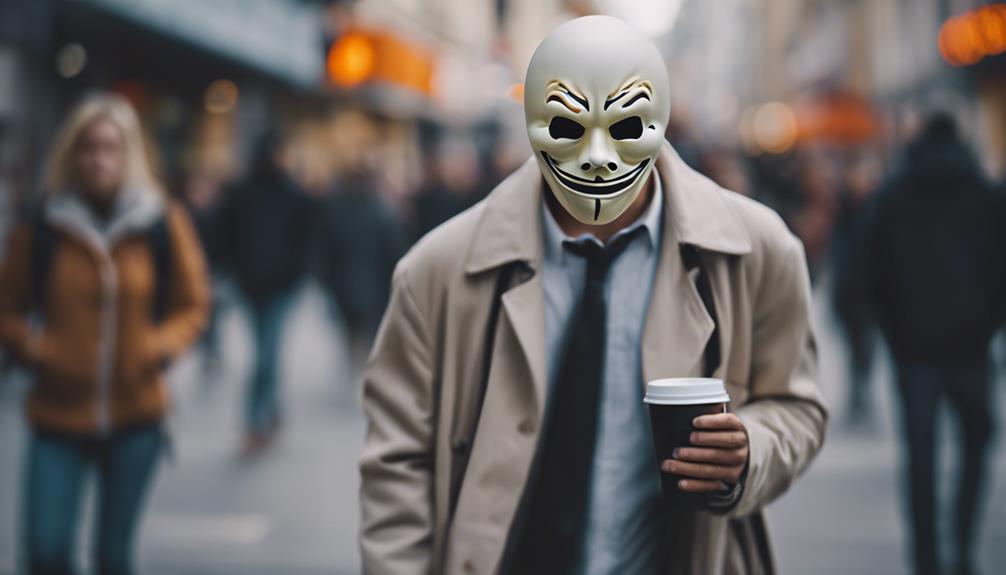
When you wear a Halloween mask, you're not only limiting your visibility, but you're also putting yourself at risk of accidents and injuries.
You'll experience restricted peripheral vision, creating blind spots ahead, and impairing your depth perception.
As you navigate public spaces, these limitations can have serious consequences, making it essential to weigh the risks before donning a mask.
Restricted Peripheral Vision
As you slip on that spooky Halloween mask, beware that it can slash your peripheral vision by up to 50%, dramatically increasing the risk of accidents and injuries.
Wearing a mask can substantially obstruct your vision, making it difficult to navigate through crowded streets or respond to unexpected events while driving or walking.
Wearing a Halloween mask can reduce peripheral vision by up to 50%, increasing the risk of accidents and injuries.
Obstructed vision can lead to a 25% reduction in reaction time, making it difficult to respond to unexpected events while driving or walking.
A study found that 22% of pedestrian fatalities occurred due to obstructed vision, highlighting the importance of clear visibility.
Wearing a mask can also reduce contrast sensitivity, making it difficult to distinguish between different colors and shades, which can be hazardous in low-light conditions.
Blind Spots Ahead
With your peripheral vision compromised, you're more likely to stumble into blind spots, where hazards lurk unseen, and accidents can happen in the blink of an eye.
Wearing a Halloween mask in public can lead to unexpected obstacles, and you mightn't even notice them coming. When you're making your way through crowded streets or sidewalks, your restricted peripheral vision can put you at risk of collisions or tripping.
You might misjudge distances or fail to see pedestrians, bicycles, or vehicles approaching from the side. In a public setting, it's vital to be aware of your surroundings, but a Halloween mask can hinder your ability to do so.
You might think you're having fun, but you're actually increasing your chances of getting injured or causing an accident. So, before donning that spooky mask, consider the risks and take necessary precautions to safeguard your safety and the safety of those around you.
Impaired Depth Perception
You'll struggle to gauge distances accurately, as the limited field of vision afforded by your Halloween mask disrupts your depth perception, making it tough to navigate stairs, curbs, and other everyday obstacles.
This impaired depth perception can lead to accidents, like tripping or bumping into objects, and can even exacerbate existing vision problems.
With an impaired sense of depth, you'll find it challenging to judge the distance between yourself and others, making social interactions awkward and potentially uncomfortable.
- Increased risk of tripping or falling due to misjudged distances
- Difficulty navigating crowded areas or busy streets
- Impaired ability to gauge the distance between yourself and others
- Heightened risk of accidents or injuries, especially in low-light environments
Mask Laws in Different States

Can you legally don a Halloween mask in public, or are there laws that restrict mask-wearing in your state? The answer depends on where you live. Some states have laws that prohibit wearing masks or hoods that conceal your identity in public, except for traditional holiday costumes.
Here's a breakdown of mask laws in different states:
| State | Mask Law | Exemptions |
|---|---|---|
| North Carolina | Illegal for those over 16 | Traditional holiday costumes |
| Florida | Prohibited, with increased penalties for crimes | Halloween costumes |
| New York | Prohibited, with exemptions for traditional holiday costumes | Traditional holiday costumes |
| California | No statewide law, but local ordinances may apply | – |
| Georgia | Misdemeanor offense, except for traditional holiday costumes | Traditional holiday costumes |
In Florida, for instance, anti-mask laws prohibit wearing masks or hoods that conceal identity, with exemptions for Halloween costumes. Violators can face increased penalties for crimes committed while wearing a mask. Similarly, in Georgia, anti-mask laws have been used to prosecute Ku Klux Klan members, and wearing a mask in public can be a misdemeanor offense, except for traditional holiday costumes.
When Do Anti-Mask Laws Apply?
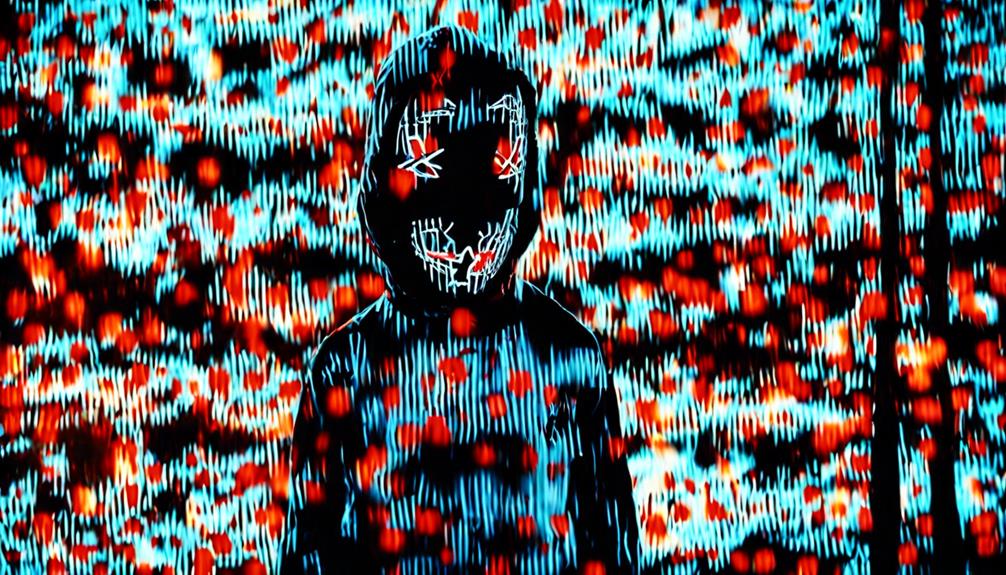
As you explore the nuances of anti-mask laws, you'll find that specific restrictions apply in certain situations.
You'll need to examine exemptions, like those for traditional holiday costumes, and understand when masks are prohibited, such as during criminal activities or to intimidate others.
Specific Mask Restrictions
When traversing the complexities of mask-wearing in public, understanding the specific circumstances under which anti-mask laws apply is crucial. As you prepare for a Halloween party, wearing face masks may be a fun and festive addition to your costume, but it's essential to know when and where you can wear them.
In some states, anti-mask laws are in place to ensure public safety and prevent illegal activities.
- In North Carolina, you can wear a Halloween mask, but only if you're under 16 or for traditional holiday costumes.
- In Florida, you can wear a mask for a legitimate purpose, such as a theatrical production or medical necessity.
- In New York State, you can wear a mask for a party or entertainment, like a Halloween party, with permission from the authorities.
- In Georgia, you can't wear a mask to intimidate or threaten others, or you could face up to 12 months in prison and a fine.
Mask Exemptions Apply
You'll need to navigate specific exemptions to avoid running afoul of anti-mask laws, especially when it comes to traditional holiday costumes like Halloween masks. While anti-mask laws may seem restrictive, there are certain situations where wearing a mask is allowed. For instance, some states exempt traditional holiday costumes, such as Halloween masks, from anti-mask laws.
| State/Country | Exemptions |
|---|---|
| North Carolina | Traditional holiday costumes, such as Halloween masks |
| Florida | Masks worn for protective purposes, such as face masks during the COVID-19 pandemic |
| New York State | Traditional holiday costumes |
| Georgia | No exemptions, anti-mask law is constitutional |
| Canada | Peaceful protests and traditional holiday costumes |
These exemptions highlight the importance of understanding local laws and regulations before donning a face mask or costume. By knowing what's allowed and what's not, you can enjoy your Halloween celebrations without worrying about breaking the law.
Safety Concerns for Pedestrians
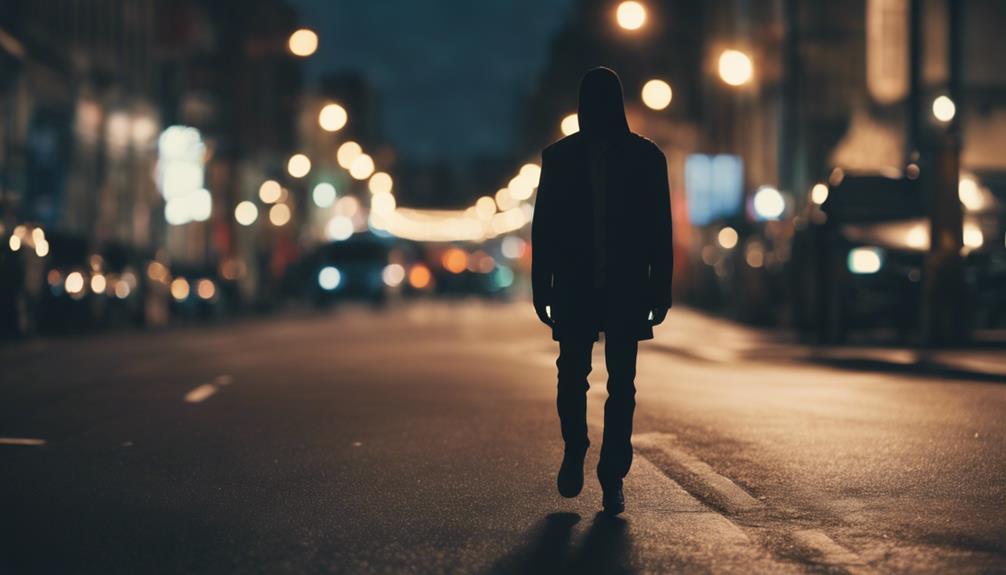
Wearing a Halloween mask can be a hazard for pedestrians, particularly on Halloween night, as it can severely limit your peripheral vision, making it harder to stay safe on the streets. As a pedestrian, bear in mind the potential risks associated with wearing a mask while walking. Your visibility and pedestrian safety are compromised when you wear a mask that obstructs your view.
Wearing a Halloween mask can reduce your peripheral vision by up to 60%, increasing the risk of accidents or injuries. Pedestrian fatalities are more likely to occur on Halloween night than on any other night of the year. In 2017, Halloween was the holiday with the fifth-highest number of pedestrian fatalities in the United States.
To increase your visibility, think about wearing reflective tape or carrying glow sticks while trick-or-treating, especially if you're wearing a mask that obstructs your vision.
Wearing Masks for Medical Reasons

Your health may require you to wear a mask in public, and fortunately, there are laws and guidelines in place to support you.
If you have a compromised immune system or underlying medical conditions, wearing masks in public can be a necessary precaution to reduce the transmission of respiratory diseases, such as COVID-19.
The Centers for Disease Control and Prevention (CDC) recommend wearing masks in public for people with these conditions.
Additionally, the Americans with Disabilities Act (ADA) requires healthcare providers to accommodate patients who wear masks for medical reasons.
Wearing masks can also be essential for people with respiratory issues or compromised immune systems.
The Occupational Safety and Health Administration (OSHA) recommends wearing masks in healthcare settings to prevent the transmission of airborne pathogens.
By wearing a mask, you can reduce the transmission of respiratory viruses by 75%, according to a study published in the Journal of the American Medical Association (JAMA).
Covering your face with a mask can provide a crucial layer of protection, and it's reassuring to know that there are laws and guidelines in place to support you.
Alternatives to Wearing a Mask

In situations where wearing a mask isn't feasible or desirable, there's a vital need to explore alternative methods for reducing the transmission of airborne pathogens. You may not be able to wear a Halloween mask in a public place, but there are other ways to stay safe.
When you can't wear a mask, consider these alternatives:
- Practice social distancing by maintaining a safe distance from others to reduce the chance of close contact.
- Frequently wash your hands with soap and water, or use hand sanitizer if soap and water aren't available.
- Avoid touching your face, especially your mouth, nose, and eyes, as this can transfer pathogens from your hands to your face.
- Stay home if you're feeling unwell or have symptoms of illness to prevent spreading germs to others.
These alternatives can help reduce the transmission of airborne pathogens, even when wearing a mask isn't possible.
Frequently Asked Questions
Can You Get Pulled Over for Wearing a Halloween Mask?
You can get pulled over for wearing a Halloween mask while driving, depending on the state and local laws.
If the mask obstructs your vision or is deemed a distraction, law enforcement may stop you.
In states with anti-mask laws, like Florida, wearing a mask while driving can lead to a misdemeanor charge.
Additionally, you may face fines or penalties if pulled over for wearing a Halloween mask while driving.
Can You Wear a Halloween Mask to a Bar?
As you slip on your spooky Halloween mask, you wonder if you can wear it to your favorite bar.
The answer depends on the bar's rules and local laws. Some bars may allow masks for costume-themed events, while others might've safety concerns or be bound by laws prohibiting masks in public.
Call ahead or check their social media to confirm their policy, and verify your mask doesn't obstruct your vision or hearing.
Can I Wear a Mask on Halloween?
You can wear a Halloween mask on Halloween as it's considered a traditional holiday costume.
However, you should make sure to check local laws and regulations, as some cities or states have specific rules or restrictions, especially in areas with high crime rates or during crowded events.
Generally, it's allowed, but it's always better to be safe than sorry.
Is It Illegal to Wear a Halloween Mask in Public in Texas?
In Texas, you're generally allowed to wear a Halloween mask in public, but there are some exceptions.
If you're over 14, you can't wear a mask to conceal your identity with the intent to commit a crime.
Additionally, some cities or private businesses might've specific rules against mask-wearing, so you should verify local regulations before donning a Halloween mask in public.
Conclusion
As you prepare to don a spooky Halloween mask, remember that the law has the final say.
While it's tempting to wear a mask in public, rules and regulations vary. Anti-mask laws in the US restrict mask-wearing in certain situations, and safety concerns, like obstructed vision, are a real issue.
So, before you put on that creepy costume, check the laws in your area and prioritize safety. Don't let your Halloween fun turn into a real-life horror story!



